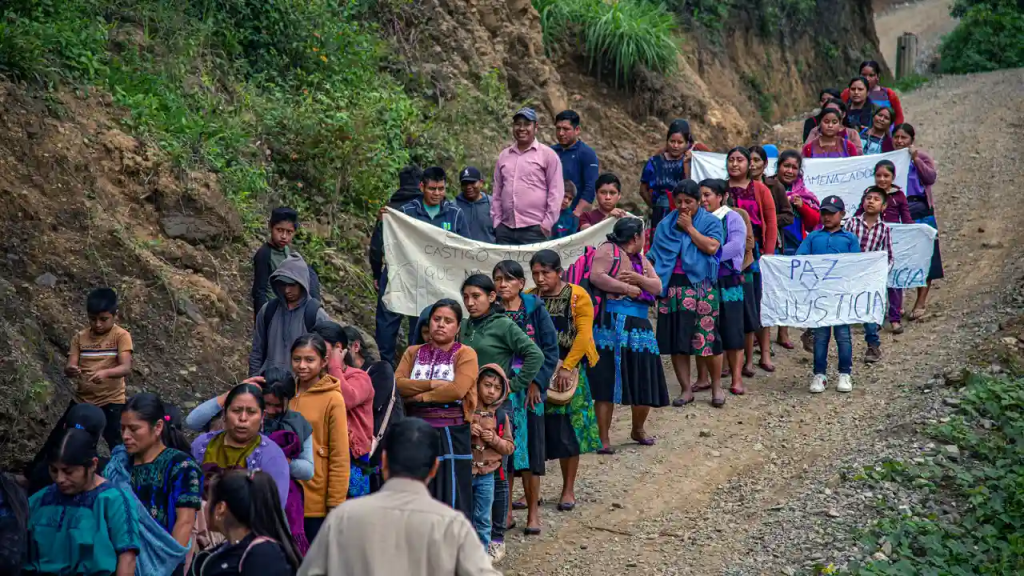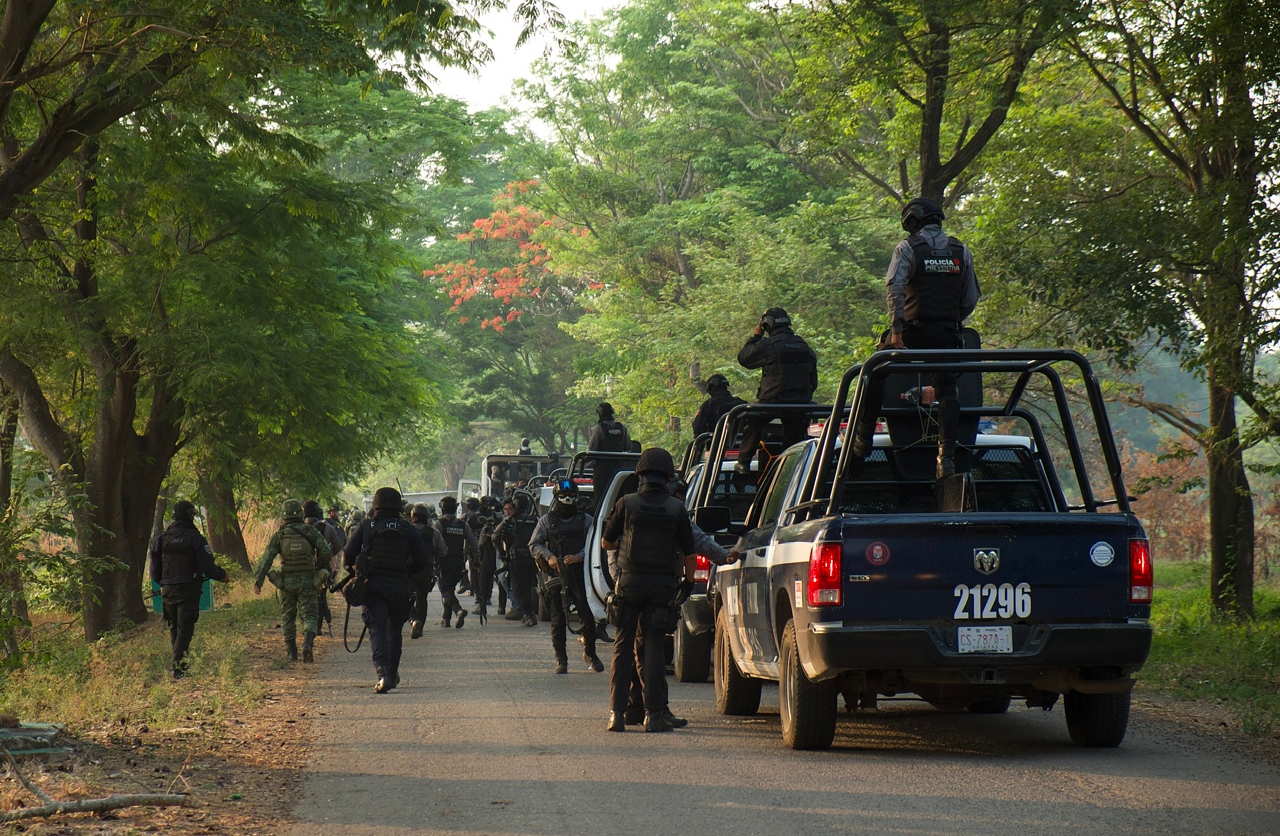Armed groups are advancing over territories in southern Mexico. In addition to controlling drug trafficking and routes used to move people and illicit goods, the drug cartels are attempting to influence election results. To this end, they have kidnapped and murdered candidates who were not favorable to them. It is also possible that violence will escalate as the June 2nd elections approach.
In Mexico, the 2023-2024 electoral process will be recognized as the largest in recent history, but also as the most violent. The academic project Votar entre balas (Voting amid Bullets) reports a significant increase in “political-criminal violence” in the country, which has become a tool of organized crime to influence the public life of states and municipalities. The report details that during February 2024, 58 events associated with this type of violence were recorded, and that from January to April 2024, 86 people aspiring to hold an elected position have been assassinated.
On June 2nd, federal elections will be held along with elections in all 32 federal entities. On that day, the new President of the Republic, 128 senators, and 500 deputies will be elected. Additionally, voters will choose governors and the Head of Government of Mexico City, as well as the governors of the states of Guanajuato, Jalisco, Morelos, Puebla, Tabasco, Veracruz, Yucatán, and Chiapas. These entities will also elect their local congresses, municipalities, municipal boards, and mayoralties In total, more than 19,000 positions of popular representation are at stake.
In addition to the change of government, 123 municipal presidencies (mayoralties), 123 Majority Relative syndicatures, 875 councilor positions, as well as 24 Majority Relative deputations and 16 Proportional Representation deputations will be elected in Chiapas. Of a total number of municipalities, 43 are considered “indigenous municipalities” by the Institute of Elections and Citizen Participation (IEPC), and in all of them, the renewal of municipal authority is carried out through political parties (with the exception of the Tseltal municipality of Oxchuc).
Democracy under threat
The Mexican democratic process is unfolding in a context of increasing violence, with organized crime intervening to influence the outcomes. Their presence challenges the control of territory and state institutions at the same time as pressures and attacks against candidates persist. In the face of governmental inaction to address this crisis, the pressure from criminal groups continues to escalate, leading to disappearances, attacks, intimidation, and murders. These violent acts affect men and women from all political parties equally, including members of MORENA, the ruling party. Moreover, this violence is spreading to both indigenous and non-indigenous municipalities.
The report Votar entre balas is produced by Data Cívica, an organization that is part of the Program for the Study of Violence at the Center for Research and Teaching in Economics. The study states that Chiapas ranks fifth nationwide for the highest level of electoral criminal violence. Due to the high level of risk, candidates running for governor and senator conduct their campaigns under the protection of the Security Protocol provided by the National Electoral Institute. This includes being accompanied by three patrol cars and being guarded by members of the National Guard.
Despite alarming levels of violence, this security protocol does not protect the hundreds of candidates for municipal mayoral positions. Since 2023, numerous candidates have reported assaulted, kidnapped, and, more recently, three have been murdered. Due to the lack of security guarantees, many candidates have responded by resigning. In fact, since the start of the electoral campaign in Chiapas on April 30, over 400 resignations have been recorded. According to the Institute of Elections and Citizen Participation (IEPC), of the total resignations, 260 were from female candidates for councilor and trustee positions, and nine were for municipal mayoral positions.
Frontera Comalapa is one of the municipalities in Chiapas besieged by cartels. Murders and road blockades have become part of daily life. Video: NMás
Kidnapping and murder of municipal leaders
The dispute over municipal offices is causing violence, not only against the political hopefuls but also against those currently holding municipal positions, as it is presumed they might influence who will replace them. On April 5, the Council President of the Tzeltal municipality of Altamirano, María García López, was kidnapped by an armed group along with other authorities and officials. After several days, the councilor sent a message indicating that she was well, but did not specify either the reasons for the kidnapping or the terms of her release.
On Saturday, April 27, Rey David Gutiérrez Vázquez, a candidate for mayor of Frontera Comalapa, was kidnapped until May 1, when he reappeared in a video stating that he was well. Earlier, on December 14, 2023, Irán Mérida Matamoros, the former mayor of the same municipality who intended to participate in the electoral process, had also disappeared. It was not until early May that he appeared in a video, being interrogated by a criminal group.
In a similarly lethal vein, was the pressure exerted by criminal groups against Julián Bautista Gómez, former mayor of the Tzeltal municipality of Amatenango, who was assassinated on April 9.
In a similarly lethal vein, was the pressure exerted by criminal groups against Julián Bautista Gómez, who was assassinated on April 9.
In a similarly lethal vein, was the pressure exerted by criminal groups against Julián Bautista Gómez, former mayor of the Tzeltal municipality of Amatenango, who was assassinated on April 9. Since Julián was the brother of the current municipality president, it is inferred that the execution contained a message for the incumbent mayor. On May 4, an attack was carried out against Juan Gómez Morales, a candidate for municipal president of Benemérito de Las Américas, a municipality located in the Lacandon Jungle, on the border with Guatemala. The vehicle entourage in which he was traveling was riddled with bullet holes and his son and two members of his campaign team were killed. Although the message sent shockwaves through public opinion, this unfortunate event only warranted a brief statement from the candidate’s party.
Months earlier, on November 26, 2023, in the border municipality of Maravilla Tenejapa, the kidnapping of Antonio Santiz Gómez was reported. He was the ejidal commissioner and a mayoral candidate for that municipality. The 53-year-old man had created a self-defense group that was facing off against a criminal group trying to control the region. The kidnapping occurred in a context of intense violence that has left several dozen people displaced.

The business of meddling in municipal elections
The municipalities of Comalapa, Benemérito de Las Américas, and Maravilla Tenejapa are located on the border with Guatemala, an area where rival groups clash to control the plazas, drug trafficking, and to open airstrips for planes coming from Colombia and Guatemala. In Amatenango del Valle, on the other hand, there is a route used by thousands of migrants traveling in containers, watched over by armed groups. Additionally, these vehicles transport weapons and illicit substances. Since each trip generates thousands of dollars, this trafficking is protected by municipal police and involves the complicity of immigration authorities. This lucrative business is the reason why rival groups vie for control over these territories.
The violence is the signal these groups send to society to gain control over the population and the government. Just a few kilometers from Tuxtla Gutiérrez, the capital of the state, armed groups have already taken control of the highway leading to the coastal city of Arriaga, controlling vehicular traffic. For this purpose, battles are a daily occurrence, leaving dozens of vehicles damaged and civilians unrelated to the conflict dead. In the municipality of Berriozábal, the police chief and his subordinates were kidnapped on February 24 and later executed. Through videos, the cartel made the local population aware of its firepower. Faced with the cruelty of the images, the population became aware of its vulnerability. They displayed impunity and no one took responsibility for refuting it.
These described cases are not isolated. Every day, digital media, social networks, and journalists provide similar information. The actions of armed groups aim to generate terror, fear, and paralysis in the population. Municipal political campaigns are severely threatened and limited in their implementation. Roads are often blocked by groups that prevent the movement of people and goods. In addition to influencing candidates through violence or agreements, criminal groups may finance campaigns and intimidate their opponents. A final alternative is to generate some type of conflict to invalidate the results if they are not favorable to them. In this context, anything is possible.
The capture of municipalities by organized crime
Having a mayor on their side means having a share of power to decide on the use of municipal territory, the freedom to install illicit businesses, control over the distribution of tax revenues, allocation of public works, and power over the police force. Faced with this situation, the local population and civil society organizations have taken different positions. Some organized communities like Chicomuselo have heroically defended their territories, but unfortunately, their determination has cost the lives of several residents, as well as prolonged displacement.
Confronting criminal groups requires much more than organization and bravery; it demands, above all, having the backing of state institutions. And this has not happened. On the contrary, in many places, the residents are targeted by rival groups or, equally bad, are surrounded by the Armed Forces.
On the other hand, few communities have expressed their willingness not to set up polling stations. So far, the most visible social expressions have been citizen pilgrimages calling for peace, justice, and dignity. The voice of the Church has also joined these demands, repeatedly asking the authorities to address the population’s needs. The three dioceses have strongly stated that there are the conditions in Chiapas don’t exist to conduct the elections on June 2.
As the data shows, the political dispute is not just at the ballot box, but in the struggle between cartels that have unleashed criminal political violence.

Araceli Burguete Cal y Mayor holds a Ph.D. in Political and Social Sciences from the National Autonomous University of Mexico (Universidad Nacional Autónoma de México) and is a professor-researcher at the Center for Research and Higher Studies in Social Anthropology (Centro de Investigaciones y Estudios Superiores en Antropología Social, CIESAS), based in San Cristóbal de Las Casas, Chiapas.
